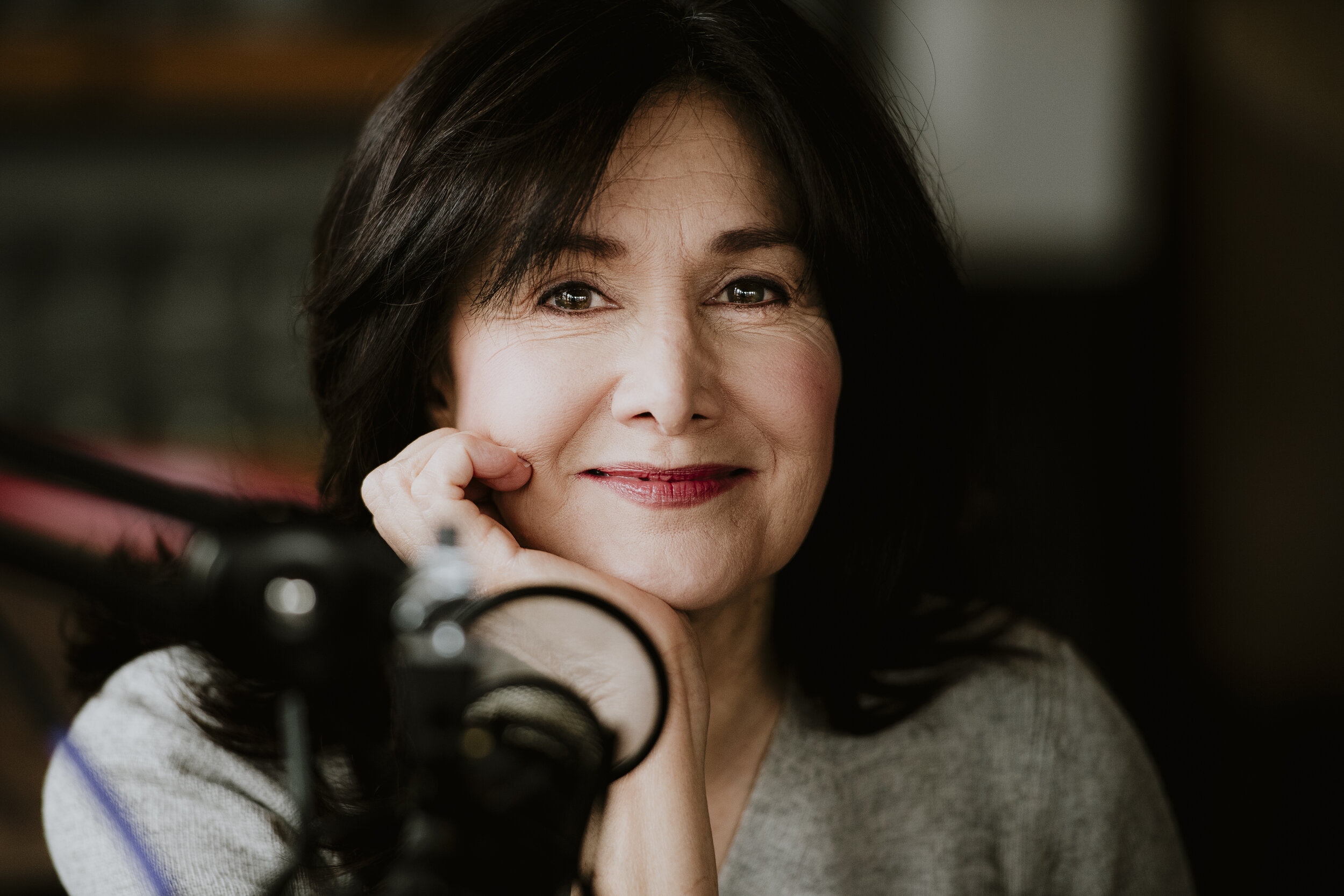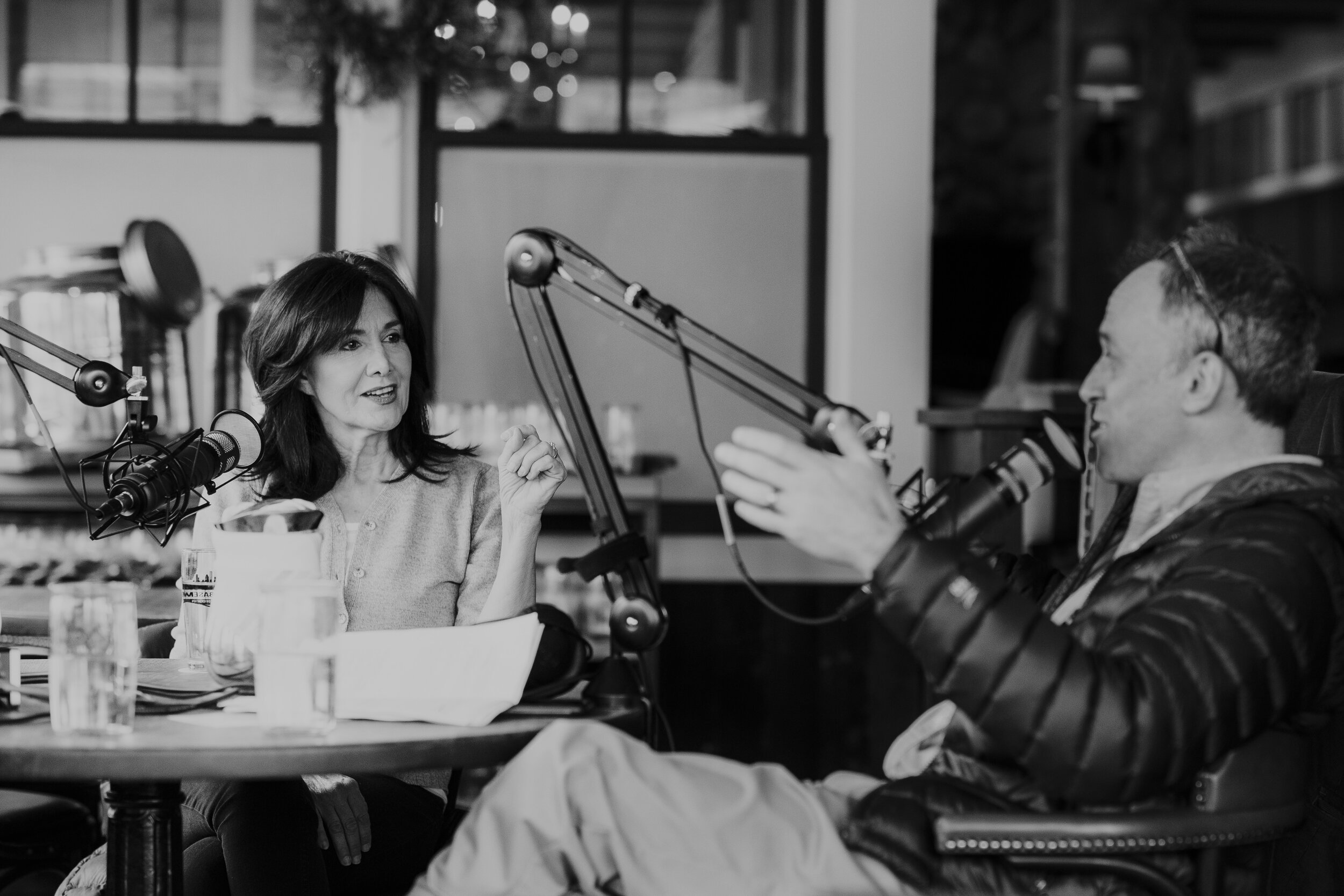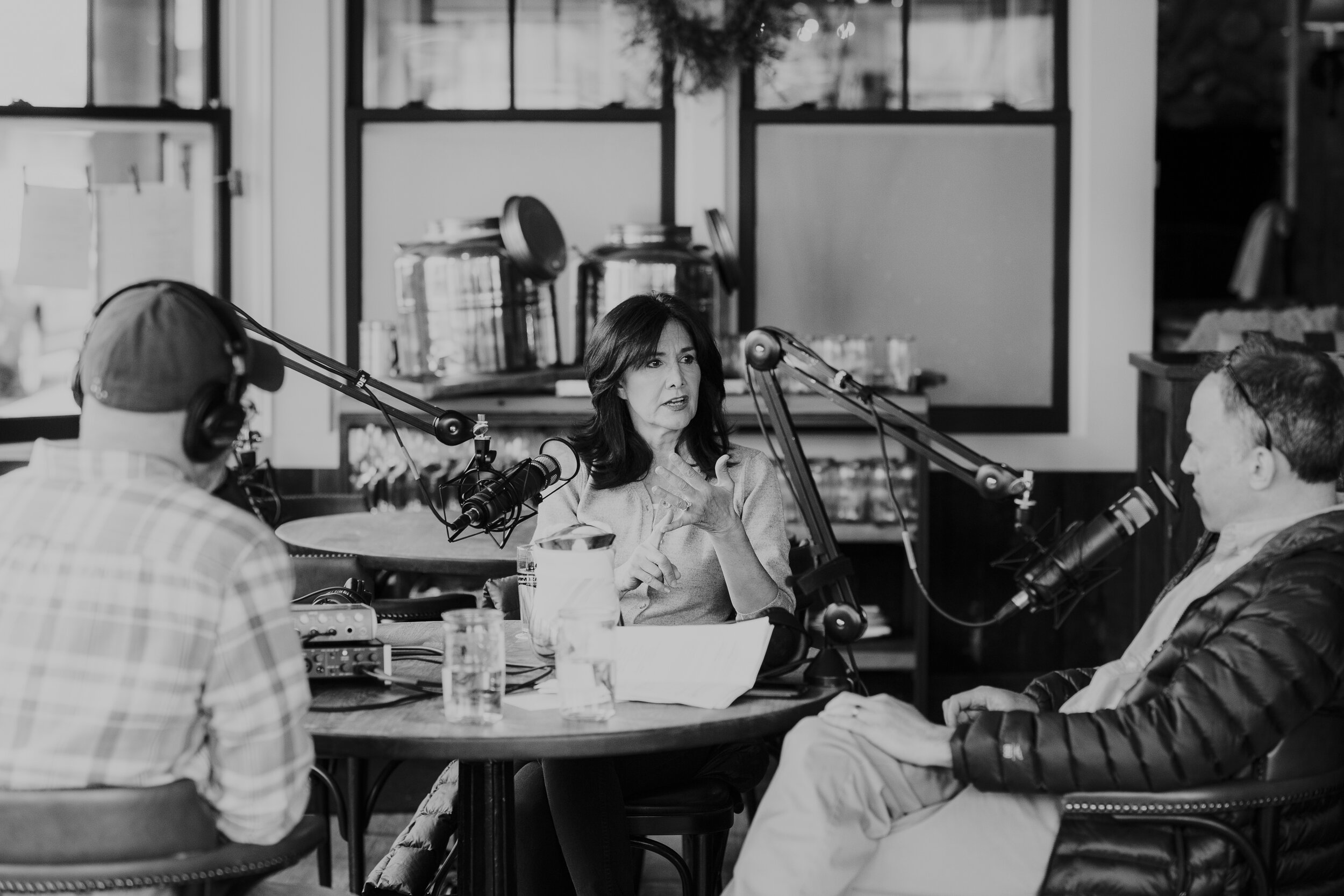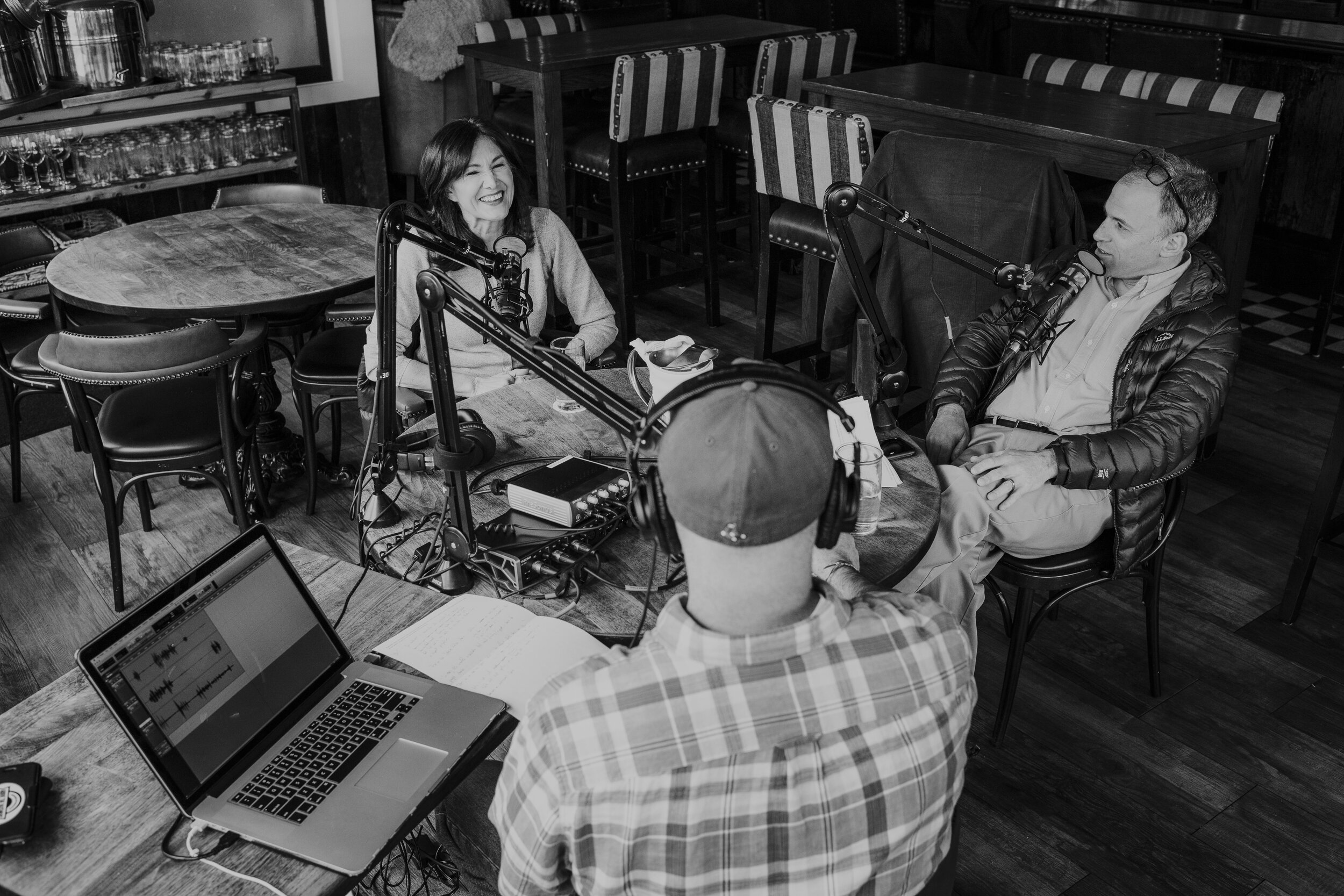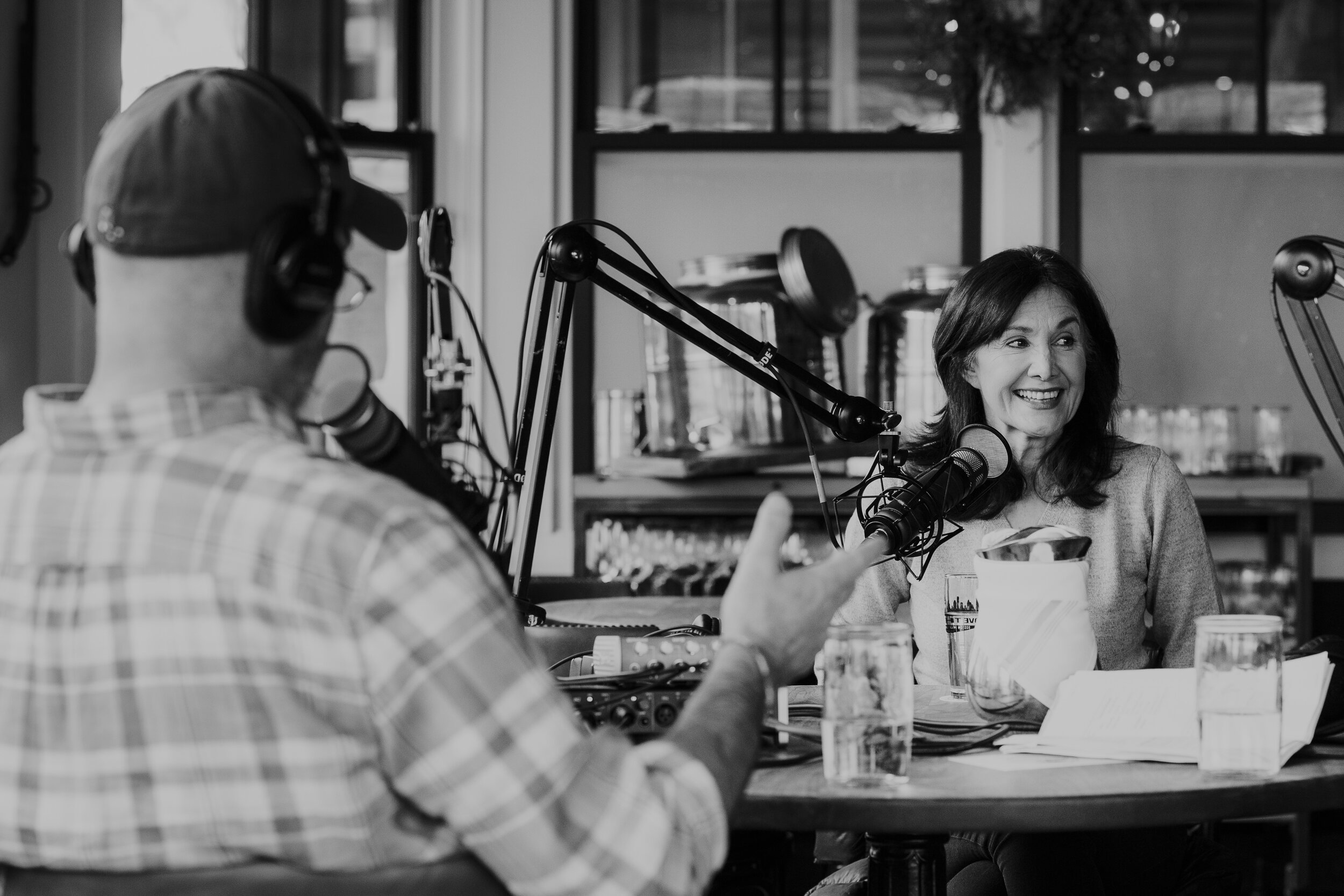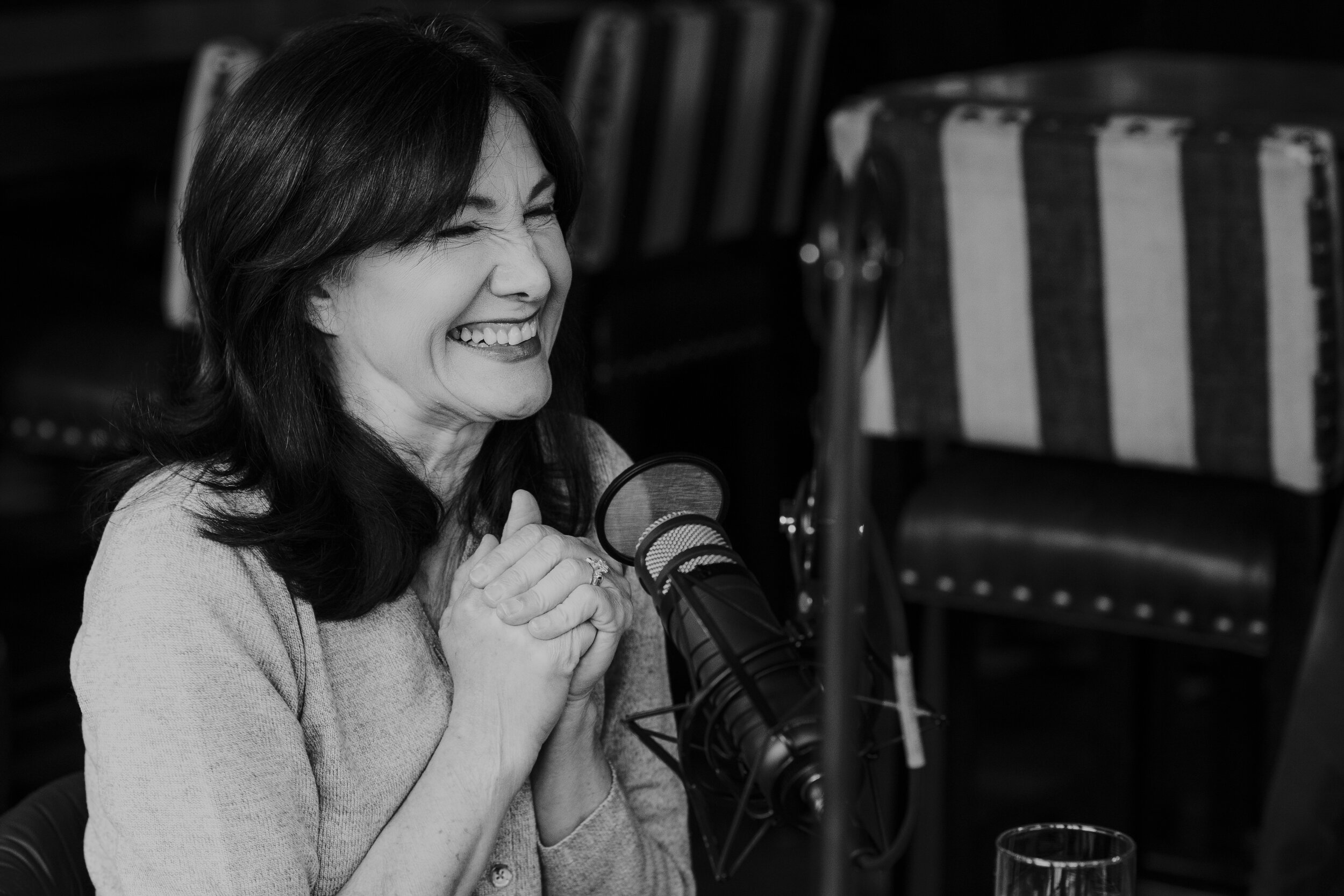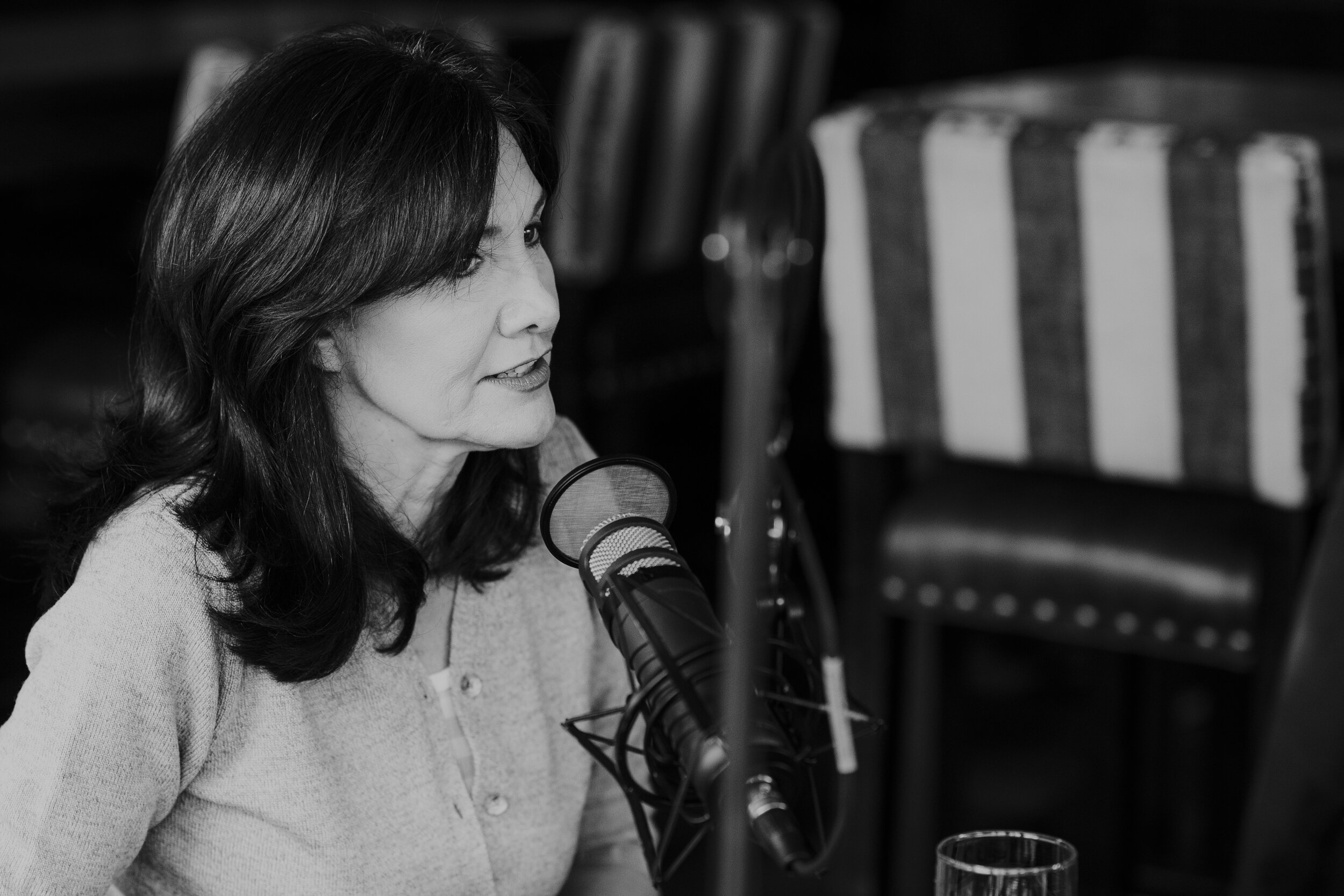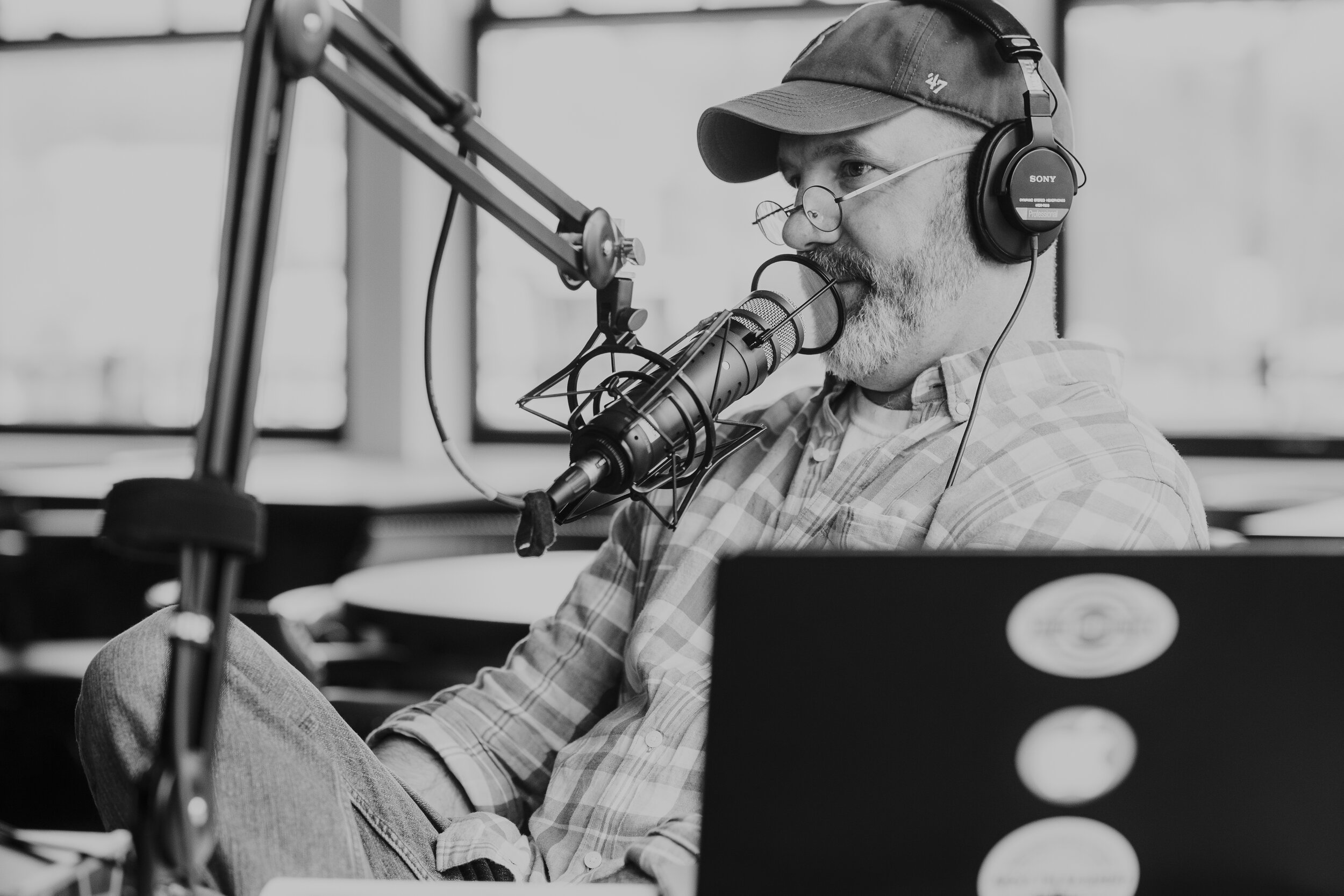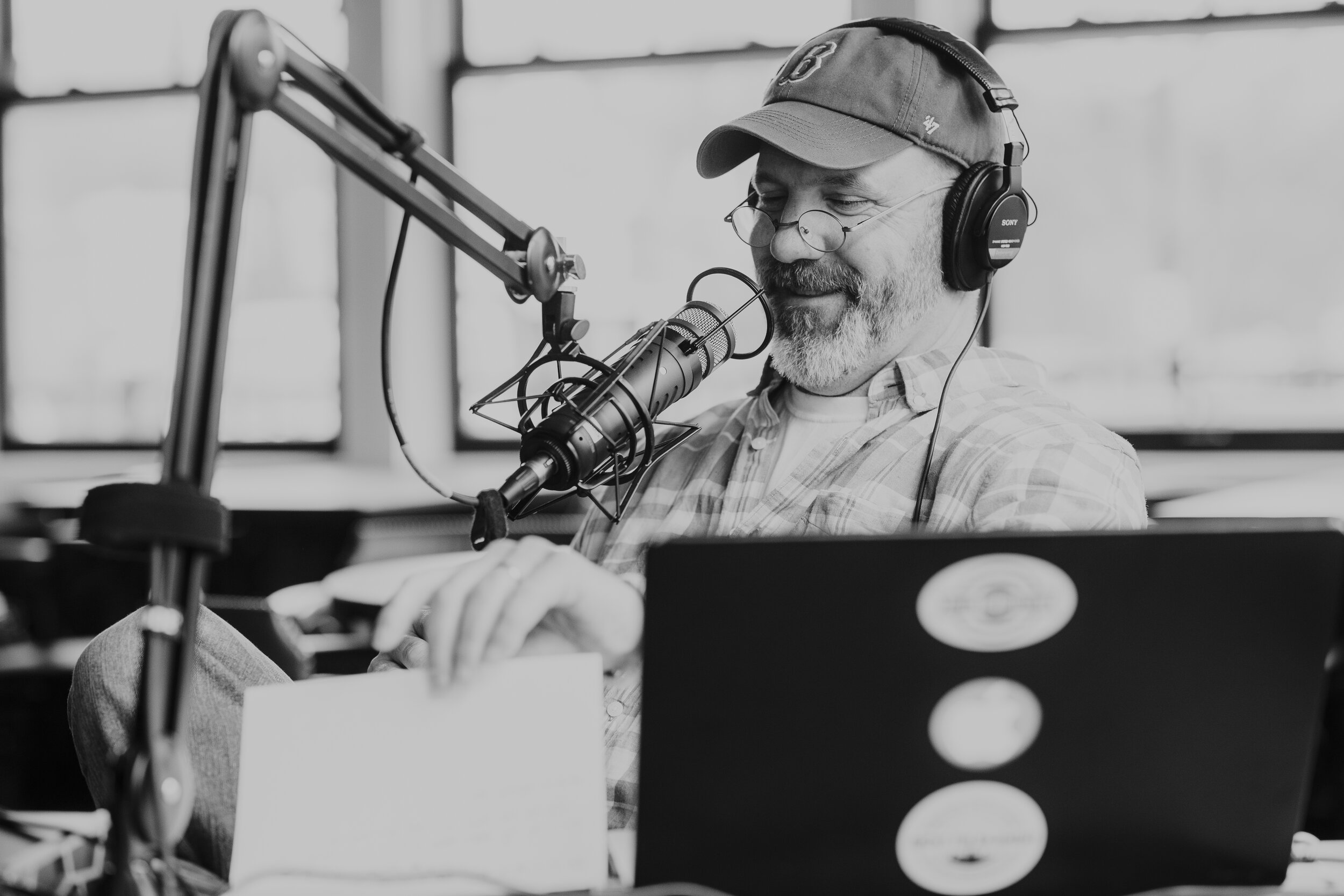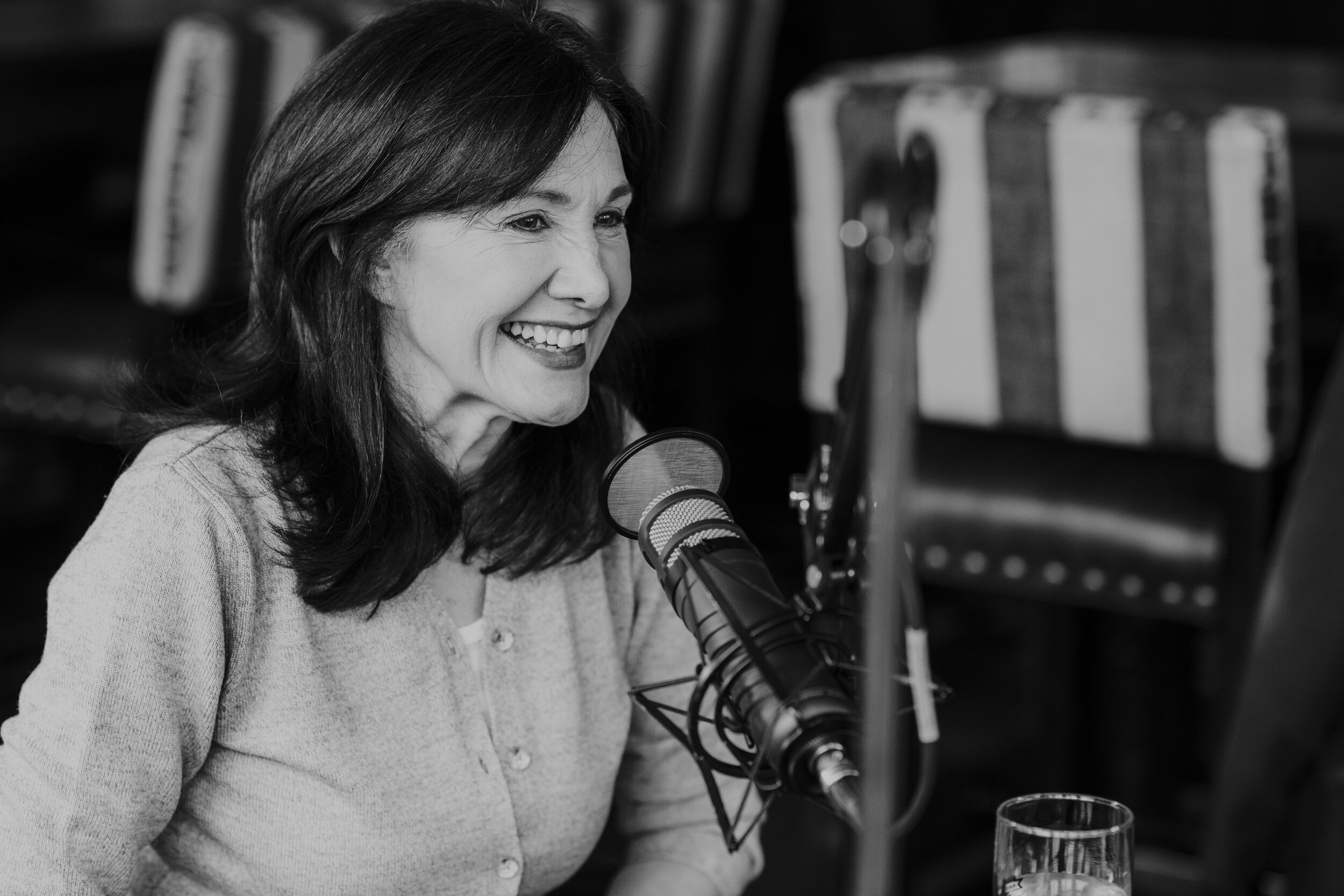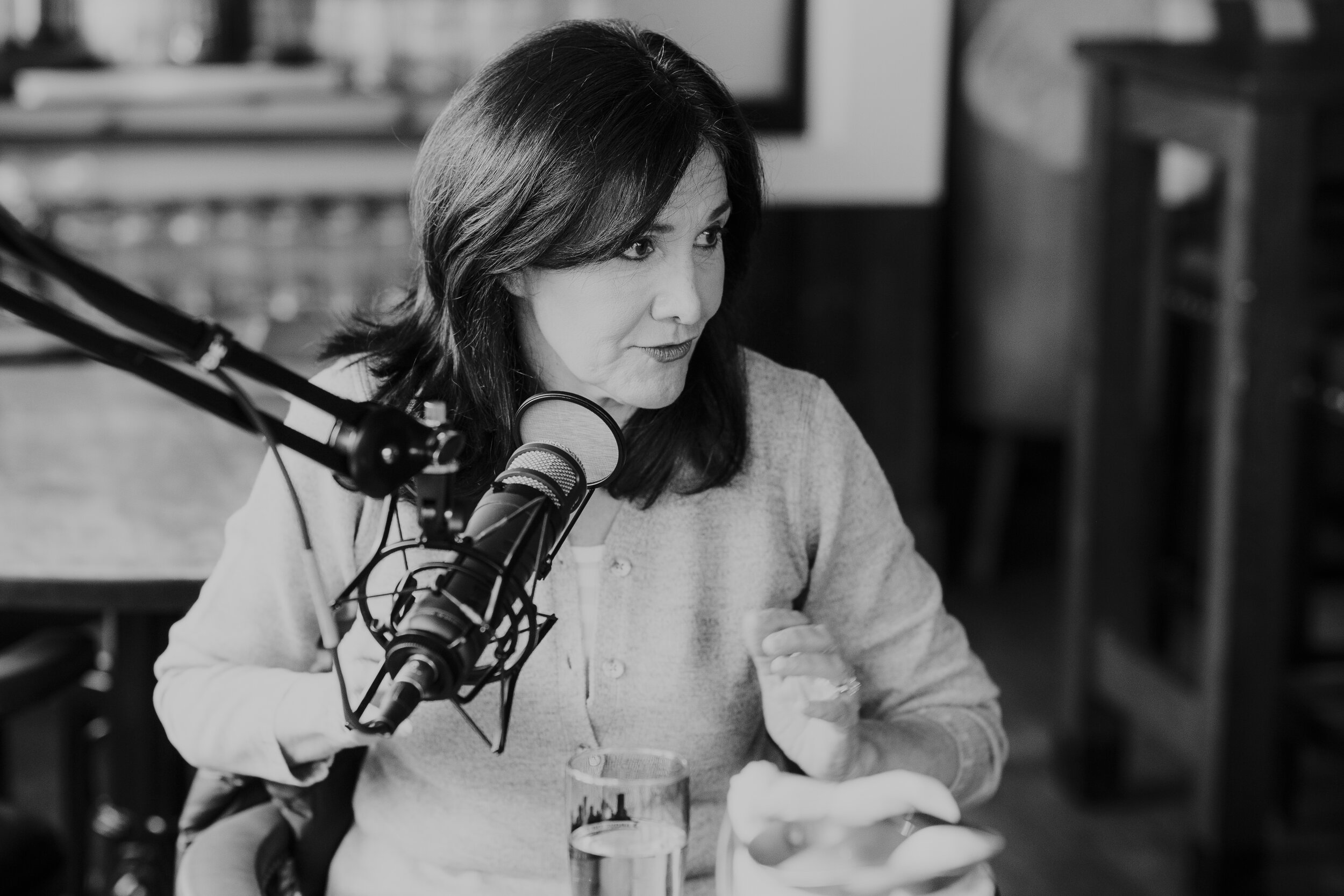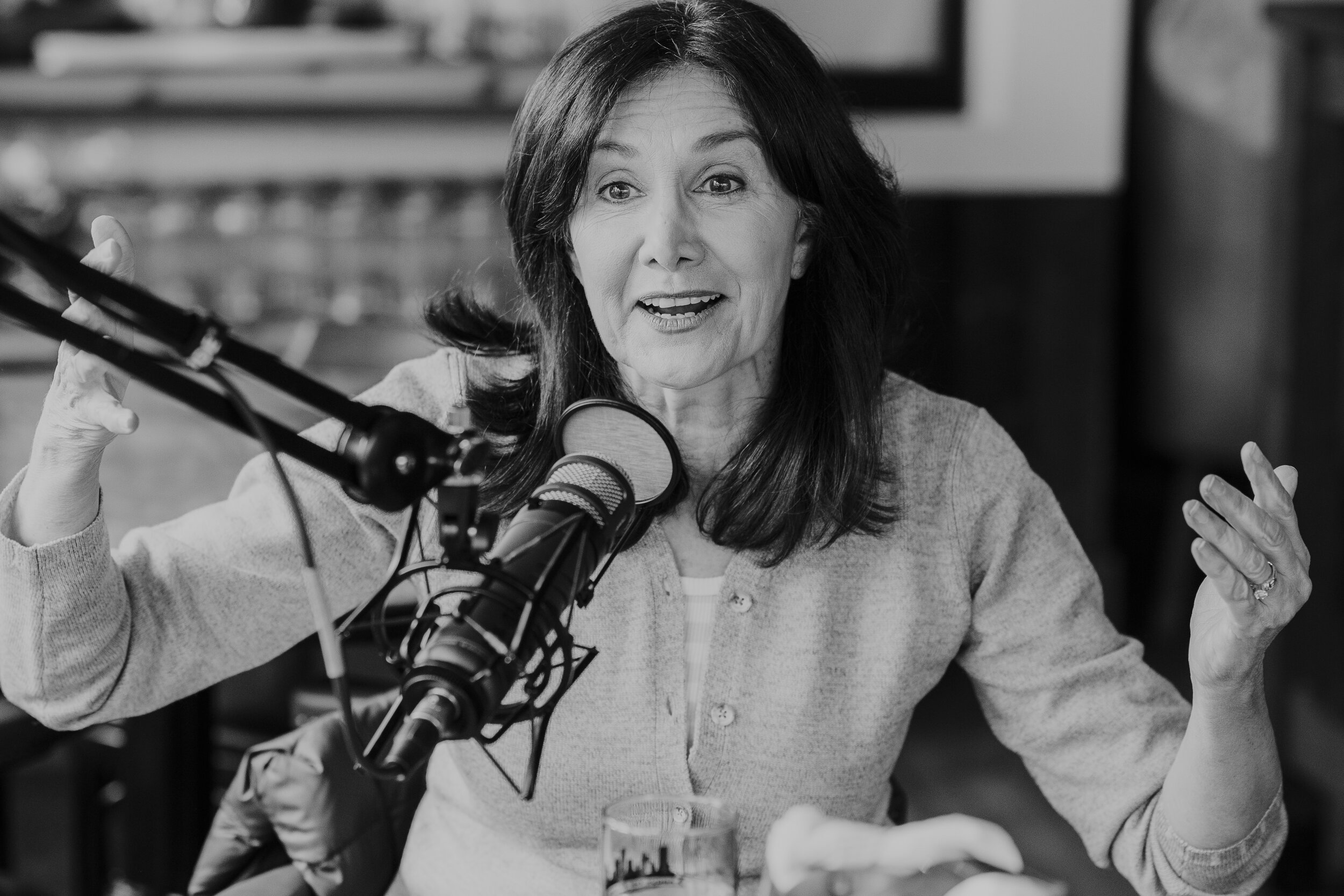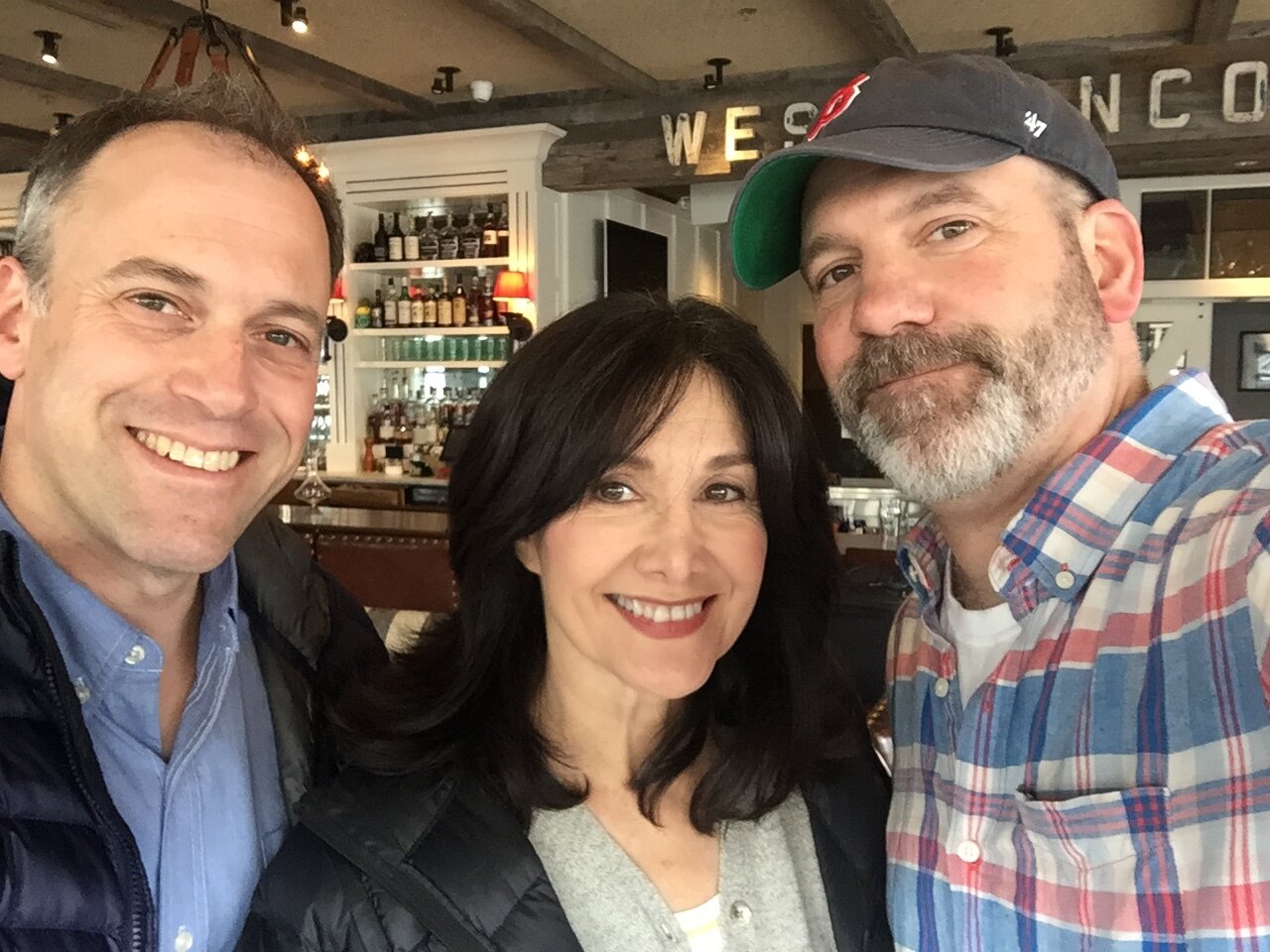Unknown Speaker 0:00
Hello, it's Chuck from above the basement Boston music and conversation. The local evening news was always a big part of my day at 6pm. We sit down to watch TV and get our fill of what's happening in our city in the world. A lot has changed since those days but the names and faces of the anchors who spoke to us every day are as familiar as they have ever been. There was recently a reunion of sorts with the Boston WBZ team of jack Williams, Liz Walker, Bob LaBelle, Bruce Shaw, regular and of course arts and entertainment reporter Joyce Culhane quick, and it was as if no time had passed since we last saw them. We ran into Joyce at a yo yo ma Silk Road performance in Cambridge last year and immediately decided that she needed to come on the show. Joyce continues to be an advocate for the arts in Boston and also offers her insight and theatre and movie reviews through her choices choices blog. She's a motivational speaker and as a three time cancer survivor. She's become a tireless Crusader against cancer and has raised millions in the support of American Cancer Society's Hope Lodge in Boston that provides cancer patients and their caregivers are free place to stay when their best hope for effective treatment may be in another city. So here is our conversation with Joyce cold, recorded at Woods Hill table in Concord, Massachusetts.
Unknown Speaker 1:14
It was that night that I booked yo yo for my living room, which
Ronnie 1:20
that's a great way to start your living room.
Unknown Speaker 1:21
I am my living room, believe it or not pretty cool. It is pretty cool. Actually, we should have probably done this podcast in my living room.
Unknown Speaker 1:28
I would have been totally up to being in your living room.
Ronnie 1:31
You said you're in Wayland. Okay, well, it's done.
Unknown Speaker 1:33
Yeah. Well, we should have I didn't I didn't even think of that. You were saying what's whole table and I thought, Oh, that's so convenient. Because I'm right out here. Well,
Unknown Speaker 1:40
that was actually the first time the first time I met you, right, other than on my TV set as a kid was was
Unknown Speaker 1:46
watching me. I did.
Unknown Speaker 1:47
I did.
Unknown Speaker 1:49
I did. And it's so funny, because I'll talk to people like oh, yeah, so I'm interviewing Joyce cleric. And they're astounded. choice. Can't
Unknown Speaker 1:56
you Really? Oh my god, either legendary or a nonentity.
Unknown Speaker 2:01
And you know, we just saw Liz Walker. We didn't meet her but we saw her. But look at the professional. That was amazing.
Ronnie 2:12
That was a choice. That was a choices choices moment right there. The right the right palm,
Unknown Speaker 2:18
and my right side is my best side. So please
Ronnie 2:21
get over. I beg to differ. Joyce, I'm on your left.
Unknown Speaker 2:24
Yeah, well, my 65 year old left side. Tell you doesn't get us here.
Ronnie 2:30
That's a good name for the book. It doesn't get easier. My 65 year old left side. Yeah. Joyce, I met you with Rudy, Tansy and OE so long. Yeah, of course, Mass General right at the panel where they had the
Unknown Speaker 2:44
extraordinary It was really the arts music therapy thing. I still use those videos and talks that I give it was completely I was completely blown away. I mean, Rudy, Tansy is a genius. And what they're doing is really extraordinary. And I still remember things that he said, Yeah, about the two hemisphere. Here's a brain and the corpus callosum being thicker, and musicians, because both halves are still me. I mean, I talk about this as another way in which the arts are crucial, and in a way that we can quantify because it's very hard to quantify that it's hard to convince people why the arts are important. I mean, you either get that or you don't.
Ronnie 3:18
I like the way you use the word convince because you said something recently about arts for art's sake, which you have to take into consideration. As you know, I'm in medicine, and I work with Rudy and others, people are starting to show scientifically that dance and music, and visual arts stimulate the brain, and are good for the kids for math, the kids for right all aspects of education. But at the end of the day, I think it's always good to just step back and say, wait a second, you don't have to describe why this works. This is just working for you. And this is the arts. These are the arts.
Unknown Speaker 3:55
I beg to differ, though, I think, unfortunately, you have to describe why you have to convince people and you have to construct an argument where you can actually measure and quantify your funding How? Yeah, absolutely. for funding because people agree. Yeah. Okay. I thought you were saying sort of the opposite. No interest, there is art for art's sake. But no, you know, these days, you really, it's important to say why and how things are important. And people who are artists know, because that's the lens through which they view the world. And it's a language that they speak, and I am on that wavelength. But for most people, it sounds like a frill, like a luxury like a little extravagance. And yeah, it would be nice if the kids could have some music, but what they really need is to go out and get a job. So how do you justify that case, in a climate where funds are so hard to come by where everybody's got their hand out? That this is a crucial thing in a person's development. And so science is helping, because we can now give you the measurements, we can show you how to quantify the actual impact the effect of the arts on a human being and how that might affect them. in the workplace, for example, whether they're doing playing the violin, or whether they're writing a computer program for somebody, or whether they're in medicine, or they've had a stroke and need how to make to know how to walk again.
Unknown Speaker 5:20
Yeah. So where do you think that started happening? Because I remember, it was when they started in schools starting to wipe out their mail program. It's always been true. But the arts have always been last on the totem. But then it seemed to get worse and like the 80s, and the schools and like, all these programs that were here, they all sudden started disappearing. You started seeing all those ads on TV musicians speaking up for arts and schools and stuff like that.
Unknown Speaker 5:43
maybe just maybe there was a consciousness about it, a recognition of something that had always been so. But it seemed to me that this has always been so and I think there's a couple of reasons for that. Number one, it is hard to quantify number two, it's true. The province of women, women are artsy, are they it's a softer, more feminine kind of way to go with the world was science and technology are masculine and masculine and math. And so we have stem,
Ronnie 6:17
which is should be steam. Absolutely.
Unknown Speaker 6:19
Yo yo and I agree on this. It's should absolutely be steam, but we've had to make the case for that sounds better to Yeah, it sure does. Yeah, its energy. Right. I mean, its energy.
Unknown Speaker 6:30
You moderated something back in 2015, when they were candidates for governor, and a current governor didn't wasn't able to make it, Charlie, but we won't really assess
Unknown Speaker 6:41
what I wrote to him once. Yeah, he wrote to me about the clash. This is so quiet. Yeah, absolutely. About the clash. He was a viewer. He was at home. I remember the first time I officially met him. He said, Do you know I wrote you a letter? I said, did I write back? He said yes. Thank God. Yeah. Now the governor, God, I didn't just was he like a college guy at the time college kid. And he wrote to me because he didn't like the report I'd done on the class. I didn't spend enough time and I never
Ronnie 7:08
I man, I'm impressed. Yeah.
Unknown Speaker 7:11
He got mad. Because Yeah, and
Unknown Speaker 7:13
he was, you know, and so he wrote me a letter. I wrote back and I said, Look, I didn't have a lot of time. And you know, it's always very truncated. And don't confuse my limitations. With the medium. You know, whatever it. I love the clash. And I'm impressed. It's really kind of cool. Yeah. But that was our first connection. But he didn't show up for this forum. Yeah, we moderated. I think they were all Democrats on the board. They were there were maybe that were sent to Martha Coakley. Was there a huge forum. Marty was there? Yeah. Yeah, it was the
Ronnie 7:45
Do you think he held a grudge about that? Although,
Unknown Speaker 7:46
I think he loved that. I wrote back.
Ronnie 7:49
Yeah. That was pretty email to his letter.
Unknown Speaker 7:53
Yeah, that's good.
Unknown Speaker 7:54
I wrote him. I mean, I you know, I straight answer everybody. I don't believe in that. Yeah, we do. This sort of a Victorian sense of I still believe in it's,
Ronnie 8:03
it's it's all in back. You know, it's
Unknown Speaker 8:05
all it's being polite. Yeah.
Unknown Speaker 8:07
I mean, sure. Everything like that's coming back, because we all want that human touch. Now, all of a sudden, everything comes.
Unknown Speaker 8:14
Lucille mm shows, right. I
Unknown Speaker 8:16
mean, that's how it is. So the reason I brought that up is I'm wondering if you can see, I mean, they all kind of agreed, yes, arts are important. And they should all be Yeah, yeah. But But you you see an improvement in Boston. As far as support for the art at all. I'm going to have your question. No,
Unknown Speaker 8:31
I don't see an improvement. Yeah, I see. status quo. I see us go through these machinations. Every single time the budget comes up, and they save they're going to slash the arts budget. And then the arts people rally themselves. And thank God, Matt Wilson over at Mass creative is doing an extraordinary job of organizing people in a grassroots way. He knows how to do that. They fight fight, and then we get back level funding, and we consider it a triumph. Right. And you know, what the funding? Is it $17 million. This is like, take it out of paper clips. That's do they use those anymore? I mean, you know, this is like chump change. Yeah, so it's not getting better. We are so culture rich. in this town. We have more arts organizations per square inch, then I believe New York City has really and that was quantified by arts Boston, in a document called the arts factor, where they analyzed a lot of things, that kind of money that the arts bring in, how many arts organizations, there are some of the, the economic impact of this, it's still it's a long road, there's a lot of people in line ahead of the arts, you know, in the NBA, and the roads and you know, are all falling apart? And you know, I mean, it's,
Unknown Speaker 9:50
it's a bridge at let this play go on. What do you choose?
Unknown Speaker 9:53
But what's extraordinary is that the arts keep going. I mean, that there are so many theatre companies, there's a thirst for it, you cannot make a dime in that the every single one of these actors, sticks to rub together. They are all working other jobs. Some of them are probably working here. What are you talking about bartenders, their waiters, musicians to their music?
Unknown Speaker 10:17
Absolutely. corpus EME is a non for profit organization. Yeah. You know, they do education too. So they do a lot of other things, but doesn't seem unusual that a restaurant slash performance space is a non for profit. I think it's great, because they're doing they're doing great right now. So you're saying it should be for profit? Well, I mean, I mean, I wish it was Yeah, right.
Unknown Speaker 10:35
Why not? Yeah. Well, the arts also have sort of low self esteem. I think that that's really sad.
Ronnie 10:42
I think it's great to have you here and many for many reasons. And I'm actually not from here. Born and raised in Boston. However, I've been in New England for years and years. From New York area, upstate New York. That's okay. So and I'm sorry about but we did bring Wegmans. So that's
Unknown Speaker 10:58
I grew up outside of New York City in Connecticut, Connecticut, right. Oh, bridge,
Unknown Speaker 11:02
Connecticut. I was born in Stanford. But I was only there for like,
Unknown Speaker 11:06
Oh, so that was lovely. And you were born in Stanford,
Ronnie 11:08
Connecticut as going to Stanford, but we moved I was born in
Unknown Speaker 11:11
the ass end of Connecticut heard that. Yeah. Bridge.
Ronnie 11:15
diagram. What were you Where were you more like the molecule
Unknown Speaker 11:18
look at them. If you look at the map of
Unknown Speaker 11:20
the county, a very wealthy County. Bridgeport is not one of those places. He was like the forehead. Exactly. Tough working class town all my family working class lower middle class worked in the factories worked at my mother worked at Sikorsky Aircraft. My grandfather worked Remington I mean, you know, I drive by says korski all the time. Oh my gosh, my mother worked there for 35 years. She can name every helicopter. It's
Unknown Speaker 11:43
a cool. It's a cool little place to drive by see all these big utility. Oh,
Unknown Speaker 11:47
yeah. And she worked at the Bridgeport plant. And then in the Stratford plant, the only city I knew growing up was New York City. So I thought every city was New York City, right. And then I thought, well, I go to school in Boston, there are a lot of schools in Boston and I we drive into Copley Square, and I sit out this is really cute. Where's the city? And they said, you're in it. And I thought,
Ronnie 12:06
Wow, this is amazing. You came to Simmons, and you were you were hooked. And you stayed?
Unknown Speaker 12:10
Oh, I love this city. Instantly, instantly.
Ronnie 12:14
Everything about all in a sense.
Unknown Speaker 12:16
It's small. And it's large.
Ronnie 12:17
There's a singer songwriter that used to have a restaurant in Boston, a merry go Shay. And she came back played city winery, Boston a few months ago. And she said something to us that I won't forget. And she said it's the most liberal, segregated city I've ever known. Absolutely correct. And I wanted to get your perspective to from when we talk about arts, and we talked about how it brings us together? It's a big question, but I'm sort of it intrigues me your experience through arts and entertainment over the years. If that's something you've thought about the connection that we all have together in that space of the arts,
Unknown Speaker 12:51
we probably haven't utilized the arts as well as we might to bring people together. I mean, what Mary go Shay says is absolutely true. It's true till the very neighborhood he place they're still very segregated parts of Boston. It's very tribal. It's, you know, very small town in many ways. But it also has an incredible transient population, the huge influx of students and professionals and executives, and a global kind of impact as well. So it's both large and small. But it's hard in Boston to cross these lines. It takes a long time in this city to do that. I mean, I still feel not like a newcomer Exactly. But I am not a Bostonian in that I wasn't born here. Unless you're born here. You can't really call yourself a Bostonian in that way. It took me about 10 years, I would say to be accepted. And then once you're in, you're in? Yeah, I think there's a lot of competition with arts groups, we try to come together, that there's such a small pot of money available. We're all after the same audiences, there isn't even enough audience. I don't think to support all of what goes on here. It isn't that you want to be so competitive. But that's just by default, what occurs. But I think all the artists working here understand that we have a lot more in common than what separates us that we're all trying to reach for, you know, this common humanity. This is what the arts absolutely access the truth, especially now, you know, in this era of fake news and alternative facts, and, you know, the artists, artists try to get it, what's the real deal? What's going on? You know, that's Shakespeare holding a mirror up to my friend. Yeah, the culture is reflected back to us through the arts, and we see who we are, we have conversations about who we are. But you gotta get all the people in the seats. You know, it's predominantly white audiences that are in theater, it's still very difficult to make these connections, but artists have as good a chance as anyone at making those connections. Yeah,
Ronnie 14:52
I think you're right. I've been looking at Joyce's choices. And it's funny, because we've talked to the waitress people. And then we talked with on your feat recently, and you have your your great article on on your feet, that I felt really speaks to that when the Cuban American experience was told by Gloria and bringing people to the theater that normally weren't in the theater, or art in the theater. And how that parallels with Hamilton. It's always better. But yet, like you said, it's still a price.
Unknown Speaker 15:22
Yeah, because you know, a theater ticket is still expensive, it's still hard to, but not every theater ticket is expensive. There's a lot of smaller theater companies that do great work. And there, it's often a pay what you can or it's a matinee, or, you know, whatever. But it's very difficult, even for people to find out what's going on and then to make a decision about Oh, was that worth seeing? And then, you know, and then all the rest of it, the parking and getting into town, or you know, all of that, and it's a complex.
Unknown Speaker 15:52
Complicated I wonder if you think I was one I was just thinking the other day, the only time you have a show come in here and stay for an extended period of time. I know like, Book of Mormon stayed for a little while. I know what sheer madness has been here for. It's the longest running in the United States or something like that. And it's a very funny, I've seen it, it's fantastic. And, and, and certainly Blue Man Group. And but what we would the Broadway in Boston, those are traveling troops.
Unknown Speaker 16:17
Big shows, usually revival, right? Yeah, yes. They're guaranteed to put people in seats. People know them. If you think that's part of the fabric of what you were just talking about that we're not getting long, extended run shows, as much as maybe New York does. It could I mean, it could be certainly the number of theaters we have here, the number of bigger theaters we have here. But I was wondering, I was wondering why they're not staying longer than just a week they're moving on to a certain it's a business model. No, you got to keep the shows on the road to make money. Maybe that's all they think they can they blanket the area with a certain number of tickets, they feel they can sell. I don't know what the thinking is around stairs. I mean, it's a good thing that they do. And there's more shows that come in, but we have regular local theater that's here all the time. And I've tried to think of something I would recommend right now. Oh my gosh, there's a gorgeous production of actors Shakespeare project, doing much ado about nothing at the Cambridge multicultural Arts Center. It's killer. Yeah, this is such a good show. And it's there for another week. And I don't know how much that ticket is, but maybe $20, something like that. That's very affordable. It's almost what you're going to pay at the movies. Now Forgive me a SP if I'm wrong about that price. But it's a terrific show. That was a large popcorn though. No. But there, they sell candy and it's a great space. And it's a really Cambridge on either Third Street or Second Street, the Cambridge multicultural Arts Center. And it's a fresh take on Shakespeare, Claudio is played by a woman. So there's this gender bending thing. And they've got a tune by I think beyond saying the thing. And the direction is really interesting staying and it's, it's just really funny and really lively. And it's light and dark. And it's well active. So that's just one and they were
Ronnie 18:09
the air T. But you know, I think that what you're mentioning, Chuck, is that Broadway in New York? Is this cultural, you know, icon or legendary group for what hundred years or more about shows that play in New York City. And so, Boston, I don't think really we get those shows. We get the shows coming through. But
Unknown Speaker 18:30
we use a pre Broadway tryout town shows us to come here first, and our critics and our audiences would have at them, and then they would tweak these shows. And then they would go to Broadway. Yes. And it's extraordinary that you don't know that. But it says a lot to me, because that's how long ago it was that we were known as a pre Broadway town. Yeah. And now we've got the colonial theater, which is just reopening, this Ambassador theatre group has come in, and they're, I think, based in London, and they are bringing in Moulin Rouge as their first show. And maybe it's going to be more of a pre Broadway kind of try out town again. But again, that whole model for what tries out where and how shows get tweaked and what new work even happens. It's very expensive to mount a new show and take a chance on it. Everything is very costly. So you know, also that the whole theater district now is really kind of revamping their Really? Oh, it's it's completely different. Yeah, it used to be, you know, the red light district now, it's a theater just yeah. So that's true for a long time.
Unknown Speaker 19:35
So that can obviously have a heart effect on the theaters that live in that area.
Ronnie 19:40
Well think about that. I mean, directly. That's true. Exactly. The I lived in the early hills.
Unknown Speaker 19:45
I lived in New York when that 42nd Street was in a place you wanted to walk around, right,
Unknown Speaker 19:49
exactly. Well, Time Square wasn't a place you wanted to walk around before Rudy Giuliani got in there, and I'm not sure I still want to walk around. But, but you can walk around Well, now it's all very corporate commercial, and you know, whatever. But but it feels a little safer.
Unknown Speaker 20:02
But it is nice to walk around that area. And you can see if this is
Unknown Speaker 20:07
now the box center with the bank. You've got the Shubert theatre right across the street, which is beautiful. You get the Wilbur that's now more of a separate club and it's for comedians, you've got the arts Emerson building now, you've got the Cutler majestic, which is a gorgeous theater right on Boylston Street there Tremont Street, we have some of the most beautiful theaters in the world. And now that also
Unknown Speaker 20:31
Downtown Crossing and we're redoing that area. It's all right there connected.
Unknown Speaker 20:35
Fantastic. You got the Godfrey hotel and you've got a whole bar scene that's come up the city's it's coming alive. But there's some things about it that are still distinctly Boston, which I kind of love an eight, right? I kind of love that you can't find your way around Boston. I kind of love The streets are crazy. I'm a very aggressive driver. So
Unknown Speaker 20:56
what's the problem? I
Unknown Speaker 20:57
do? Exactly. So I enjoy Am I think I really am. You know, I kind of love that you have to know certain things about the place or you can't figure it out.
Ronnie 21:06
Well, it's Darwinian, you know, let me
Unknown Speaker 21:09
like survive here. Kind of like it makes it tough.
Unknown Speaker 21:12
If I'm in like the financial district, I'm totally lost. We were trying to find this place the other day, and I was I had no idea which direction to go
Unknown Speaker 21:19
and guess the financial district is a spit away from the Downtown Crossing. It's right there, which is right near the Back Bay, which is right. I mean, you know,
Unknown Speaker 21:30
but if you gave me give you $100
Unknown Speaker 21:32
Roxbury, let's talk about you know, we're Florian Hollis, you know, we're Hibernian Hall is Do you know where those places are? Do you know where the strand theater is? I mean, you know, that's the part of town that needs to really wake up a lot of that has to do with the way in which economically those parts of town had been discriminated against the globe just did that extraordinary spotlight report on the net worth of an African American in Boston $8. The closest this city to that would be Philadelphia with $17. That's just a crime. You know how many liquor licenses get handed out in that part of town, not as many you should be. So the strand theater when they were mounting productions there a couple years ago, you wanted to pop out and get a drink or a cup of coffee at a cafe. It didn't exist. I popped out to get a cup of coffee during intermission and I couldn't find a place anywhere. This is all deeply tied in with the economic fabric of the city. The politics of the city, Ayana Presley is working on this right now. That's the part of town that needs to come alive. And there are artists there and they are trying hard to connect what would help with connection building up these parts of town liquor licenses in some places so people can establish business in this area.
Ronnie 22:50
People don't really get out of house much anymore. Yeah, even in the places that
Unknown Speaker 22:56
I actually asked Diana Presley this question. I said, What do we do? She said, you know, talk to people invite people you're having a dinner party or given a block party or invite people from across the way. invite people you wouldn't normally connect with socially. Have you been to Wally's cafe
Ronnie 23:11
on massive it's a jazz place in the brownstone. So it's a it's a bar
Unknown Speaker 23:16
and live music.
Ronnie 23:18
So right at the end of the brownstone is the best jazz you'll hear in the city. What's fascinating is that it is half white, half black. Yeah, it's one of the only places I've ever seen an anomaly where they there's a cross and what is it? music that's a unique place has been around for a long time.
Unknown Speaker 23:34
So everyone knows this. We know music is the universal language. We know that but how do we create a place where people can come together? So Wally's cafe has figured this out? And why is there only maybe one Wally's cafe?
Ronnie 23:51
And it's small and it's jazz? And can you do it with classical and rock? Absolutely. Is this something about jazz? Probably? Well, jazz, you know,
Unknown Speaker 24:01
it's really tough to find venues to, I mean, jazz, they cut Eric Jackson on the radio. I mean, they just don't feel like there's a big appetite for jazz. But there may be I mean, it's all what's perceived as commercial and hip hop, it has more of a foot in Boston absolutely didn't. We've talked about bars, totally, and rapids have totally changed the landscape. It is now what is happening. So we need to find places where that can happen frequently with people of every color, but that's how do we bring them together? But
Unknown Speaker 24:32
that's what we found talking to some of the rap and hip hop artists use their shut out from using the venues they won't they can't get the venue. Yeah. And not only that, there's now a big problem of rehearsal space for bands.
Unknown Speaker 24:42
Yeah, there is actually trying to figure that out. There's some just recently trying to figure out but mostly she's focused on theater, I believe. Yeah, but rehearsal space of all kinds. Yeah. Woods Hill table. I mean, this is not necessarily a hotbed of rap music and working.
Ronnie 25:02
You haven't heard of West conquered hip hop.
Unknown Speaker 25:04
Yeah, exactly. I'm thinking about a bit that Steve Sweeney does. Oh, yeah. Yeah, he does a rap about, you know, I got my back against the wall at the Chestnut Hill mall. I mean, he's just so funny. But yeah, I mean, we got to start with the city and try to find places where people can come together. And we've got, obviously some of the best musical institutions from, you know, Berkeley to all the conservatories and all of that. I wanted to ask you, I know you have to leave here at four. So but I wanted to ask you, I know you three times you were diagnosed with cancer with cancer. And I'm a very healthy person. That's fantastic. I mean, really?
Unknown Speaker 25:42
That's fantastic. And we've all had friends and family who have had families, but you were just starting off your career, right? In TV when you were first diagnosed.
Unknown Speaker 25:50
I was 26 years old, and I was about to get married in about a week
Unknown Speaker 25:55
that not only didn't happen then didn't happen again.
Unknown Speaker 25:57
Yeah, years later. So I had malignant melon Noma, which is the most aggressive, vicious, deadly form of skin cancer and it's still an incurable but they're working on immunotherapy on that and other things. I guess there's a vaccine or something, you know, so you probably know more about that.
Ronnie 26:12
Well, not specifically, but I know as much probably as much as you do now. Yeah, it's really hot right now. Yeah. melanoma immunology of cancer and how we can prevent it
Unknown Speaker 26:21
immunology. And then there was angiogenesis, which is Judah folkman's. And Judah was also in my living room. I'm very involved in cancer and cancer research and tried to raise awareness about that. And then there's all the gene therapy that they're doing and all the targeted therapies, and
Ronnie 26:38
because cancer has so many arms to it, and one of the things is that I've seen that you've been involved in as the Hope Lodge. Yes. Which is an incredible place for people to come from all over the world to stay for free for free while they with their
Unknown Speaker 26:52
families. Yeah, well, I'm glad you brought that up.
Ronnie 26:55
People give money for others to stay for the it's a huge, huge expense, where they don't have to put money into their own hotel,
Unknown Speaker 27:03
can you imagine getting a diagnosis of cancer finding out that the only life saving treatment that you could get was, you know, 1000 miles away that if you didn't get it, you were going to die? And that the only way you could do that would be if you could figure out how to stay somewhere for six weeks or eight weeks, and you didn't know anybody there and you were going to have to stay in a hotel for that time, you wouldn't be able to afford it. So you're trying to make a decision between Can I spend this money or shall I die? Do I give up? Do I What do I do so Hope Lodge provides free lodging for cancer patients and their families? It's bad enough to have that diagnosis, let alone being shoulders. Yeah, I mean, it's just incredible. So right now they're in the middle of trying to utilize the space that they have a little bit better. So when we first cut the ribbon on Hope Lodge, which is the only hope lodge in Boston, there's only one and I wish there were, you know, five, they're trying to re utilize that space expand a little bit. And so we're trying to raise money for an expansion, but it's within a certain envelope that's already there. And that's as much as we're willing to take on right now. We just had a little fundraiser at the house and tried to get people reanimated to pursue this, but they're right in the middle of trying to do that. So it's a fabulous thing. It's like a Ronald McDonald Houses but people know Ronald McDonald House they don't know hope, la right,
Ronnie 28:18
and how do we get the word out if we help?
Unknown Speaker 28:21
One good way, so thank you.
Ronnie 28:23
But how do we what's the Is there a website? Is there something there?
Unknown Speaker 28:26
It's the American Cancer Society, it's the Astros Anika Hope Lodge in Boston. So you would just go to the ACS and look, just look for anything on Hope Lodge 10 years after the melanoma, I had ovarian cancer, and then I had ovarian cancer again and recurred it recurred. And the doctors were thinking this is another very difficult cancer because it's always diagnosed late. And for some reason I had symptoms, even though it was at a very early stage. And I was misdiagnosed every single time. So it's really kind of a miracle. You know, the doctors almost killed me, then they saved my life.
Unknown Speaker 29:01
The good thing is that you always questioned always you even got second opinion. So this is
Unknown Speaker 29:06
my big my big thing. You have to take your own life in your hands. You have to be willing to confront people or challenge you know, confront is the wrong word. You need to challenge what doctors tell you. Yeah, because it's a moving target. It's a moving target, it's tough to die, there's going to be mistakes, you live inside your body, so you know it better than anybody else. So your job is to try to convey as much as you can. And it's a doctor's job, to not just stay within the statistical norms and kind of look at you like a statistic because nobody is a statistic. Everybody is highly unique. And I fell outside of statistical norms every single time. And if I didn't speak up, I would not be here right now.
Unknown Speaker 29:48
And you were also talking about you know, men, especially too because they'll they won't go to the doctor. They don't
Unknown Speaker 29:53
even go to the doctor right so there's MMO go but they're afraid to quit there's
Unknown Speaker 29:56
that great billboard where it says you know, thousands of men will die stubbornness and then someone spray painted on it. No, I won't. Is that that was pretty funny. But actually right so the reason I The reason I brought this up is because you being first of all, you're your pianist. Yes. I play the piano the piano and you know so at the time you had certain your career you would you would the arts reporter right. I watch you every night growing up when the evening local news was the news to watch. That's the right. That was the one shot Yeah, I'm not the I'm not the only one. That was what we did. That's what you did six o'clock. You sit and watch the news, unfortunately, DVR. Funny, but I wonder if at the time if the art and your musicianship and going to see theatre, did that help you through the process? We mean, you just beginning your career, so maybe it wasn't quite as a therapeutic thing for you.
Unknown Speaker 30:47
one step removed. It wasn't like the arts helped me you know, what helped me? Yeah, finding out that there was a tremendous font of love and support out there that I didn't even realize was available, how good people were and are it actually chokes me up to this day. I still meet people because I was very open about my disease. I didn't see any percentage in hiding it. I was going to be ill I was going to be ill while I was on TV. There was a good chance I was going to lose my hair. I actually didn't it just got kind of ratty looking. But somebody said Oh, did you see that horrible wig Joyce Calais cat on the that's no horrible way that's my air. And I and it was growing all the way down my back because I didn't want to cut it. And the doctors were wrong about that. They said I was going to lose it. But I didn't lose it. But what was amazing was I didn't want to put any energy into hiding. I just wanted it to be known. I was ready to take anything anybody wanted to send my way I needed all love help and support I could get people just wrote me letters, cards, I still have things people sent me I'd restaurant send me food. I have dishes that they sent me I have flower arrangements with like birds on them that I keep in my house. I meet people now you know who might be 50 6070 years old. And they say oh, I remember when you were sick choice. Are you okay? And I prayed for you. And it just gets me every time. Well, you are fabric of our lives. You It wasn't
Unknown Speaker 32:07
me. We saw you every day. Yeah, every day. And you told us what to go do and see and what
Unknown Speaker 32:12
not to see and what not. And so when people would come up to me and they say Oh, do you mind if I'm saying hello? Or that I'm recognize you? I'm like, Are you kidding? Yeah, it's so great. I mean, it's the reason I had my job. Yeah, the audience, we always have to remember the audience. So I respond to every card. Every call every email, I spent hours now with people emailing me, you know, there's a fabric, there's a community, and people are just people. And that's true of yo yo, that's true of Meryl Streep, and I've talked to them all. We're all the same. Everybody wants to be loved and accepted. And we need to plug into that and believe that
Ronnie 32:53
that's beautifully said there has to be people that you've responded to, or that you've had an impact with, with the thousands of years out there that have seen you in the eyes and ears through that ordeal that were saved in a sense because of their trips to the doctor. Oh, yeah, they're just awareness of, oh,
Unknown Speaker 33:11
every time I see cancer, every time I I'm out there, I tell people these stories, and I tell them my story. And then they'll come up to me and say so and so heard your talk went and got diagnosed, and she found her ovarian cancer early. It must be amazing. It's what I'm here for. You know, I'm thinking, I don't know why I'm here. Exactly. You know, maybe this is all artsy, artsy, but there was no cancer in my family. That
Ronnie 33:35
should be the name of your show, by the way.
Unknown Speaker 33:39
But yeah, and
Unknown Speaker 33:42
my job was to get the disease, get over it, tell people about it. And then you take in as much love as you need to make you well, and then you pass that on when you're well give it to somebody else, you know. So there's this big, wonderful momentum that goes on. I tell people who are sick, let people help you let people love you be receptive, if you can, and everybody does this differently. Not everybody is going to be that open, don't force anything. But allow yourself to be embraced by folks and then be well, and then you know, you'll have a chance to give that back.
Ronnie 34:15
My wife actually is. She's in medicine, and she worked actually works with mindfulness for oncology patients. I'm wondering if that's come up in some of your conversations about not just music in the arts, but that meditation space mindfulness for wellness,
Unknown Speaker 34:30
mindfulness? Absolutely. And there's many ways to be mindful Yoga is mindfulness. It's a meditation in motion. The second time I had cancer, I actually figured out that I was not well right after a yoga workout and I'm not any kind of you know, I mean, I work out you know, once every five years it's really
Unknown Speaker 34:52
great. I it's whatever you're doing, it's working.
Unknown Speaker 34:54
thin, thin five years and flabby. There it is. My dad was very good. So I you know, I lucked out in the metabolism department. But now I don't work out but I happen to do this yoga workout. And it actually I don't like exercise very much. But I do like yoga because it engages the body and the spirit and the mind. That's why I love the arts because it engages all of me somehow even sitting in that seat, you instinct.
Ronnie 35:20
I feel you know, yoga and music. Absolutely. Now you talked to sing once, right? Very
Unknown Speaker 35:25
briefly. I really like him like to get to know him better. I'm thrilled. Oh, the yoga so the Yeah, the yoga workout. And right after I finished this yoga workout, I felt really cold. And I had chills and I I forgot to put the thermostat up. And I looked in the thermostat was up and I realized I was cold. And within minutes, I started being wracked with pain. And I had a fever and chills and I felt horrible all at once. I think to this day, the yoga workout tuned me in some way that my body was making itself heard. And I got to a hostile spittle and they misdiagnosed me and set me after about a week I insisted I wasn't well, I knew I wasn't well, freaking doctors. Yeah. You know, they'll kill you. And then then they'll save your life. So I love doctors. I'm very hard on them. But we need to challenge them. They're not gods, I
Ronnie 36:18
think we need to challenge podcast hosts
Unknown Speaker 36:21
were challenged
Unknown Speaker 36:22
so So mindfulness, yes, we have to be tuned into our bodies and trust what they're telling us so that we can tell our doctors and doctors need to know that there's information in there that they need to focus in and get app to help people not everybody is incredibly articulate. Some people don't like to talk. Some people are not tuned into their bodies particularly well. So doctors can come up with a set of questions that will help guide it's like a guided meditation or mindfulness. I think you're right, get at what's right there. It's all there. It's all here. doctors need to see it. And the good ones you know, medicine is an art and a science as everything is right. Yeah, it's all connected.
Unknown Speaker 37:05
Well said, well, I've only seen you maybe twice in person and many times and TV and every time I see you have a big smile on your face. So that's good. That's gotta help person I know it's gonna be on Saturday so we'll see is it outrageous?
Unknown Speaker 37:19
Oh, you're gonna be there was a fantastic
Ronnie 37:21
response or is this a little bit too much of us in one weekend?
Unknown Speaker 37:24
You know I've had it might be it might be we'll keep we'll keep it for me because I'd be thinking oh, they're gonna be stalking me these two there again. They are the cops is like wandered into a gig right? didn't
Unknown Speaker 37:37
plan you walked in. And I was wearing my Bruins jersey and I just
Unknown Speaker 37:43
had a drink and you left.
Unknown Speaker 37:44
Yeah, we were trying to get into a restaurant. We thought Oh, let's pop over to the Main Street cafe. Yeah, we're playing there. Wednesday Night. Very cool place you sounded terrific.
Unknown Speaker 37:50
Oh, thank you for saying that. I know you're But
Unknown Speaker 37:52
no, no, no, you send it to me because I know you can be tough. I know. You gotta tell the truth.
Unknown Speaker 37:59
That's my computer. But thank you for sitting with us. We really appreciate it. Thank you. And you look fantastic. And we're looking forward to seeing you on Saturday.
Unknown Speaker 38:06
Can't wait. Art rages. Is it art rage? rage? It's
Unknown Speaker 38:09
going to be at the the sugar Brooks instead of because it redoing the whole building umbrella, which is going to be fantastic.
Unknown Speaker 38:15
So what are you wearing Chuck?
Unknown Speaker 38:17
No, no, no, come on.
Unknown Speaker 38:19
Right in the pink tool. Well,
Unknown Speaker 38:21
I look great and everything. Yeah, to be honest. We should
Ronnie 38:23
show your headshot. I got my
Unknown Speaker 38:27
baseball cap.
Unknown Speaker 38:28
Yeah, I just get the ball guy. So I need the baseball cap for warmth. But thank you very much.
Unknown Speaker 38:32
You're welcome. Thank you. This has really been a pleasure. You made it very easy.
Ronnie 38:35
We travel Thank you so much. I
Unknown Speaker 38:37
read more about Joyce and check out her reviews and her thoughts about art, entertainment and life at Joyce's choices.com You can also find out more about the American Cancer Society's Hope Lodge and donate@cancer.org and search for the Hope Lodge facility in your city go to above the basement calm where you can join us on Patreon. Sign up for our newsletter list and subscribe to our podcast like our Facebook page. Follow us on Twitter and look at all the nice pics as we post on Instagram. We are everywhere. On behalf of Ronnie and myself. Thanks for listening. Tell your friends and remember Boston music like its history is unique.
Unknown Speaker 39:16
How would you like to join us in creating great conversations that inspire and connect Patreon is a membership platform that provides a way for creators like us to build relationships and provide exclusive experiences to subscribers or patrons. We have been self financed since we got off the ground in June of 2016. But in order to continue to fully invest all we can in each episode, we need your patronage. For more information, please go to patreon.com forward slash above the basement
Transcribed by https://otter.ai


